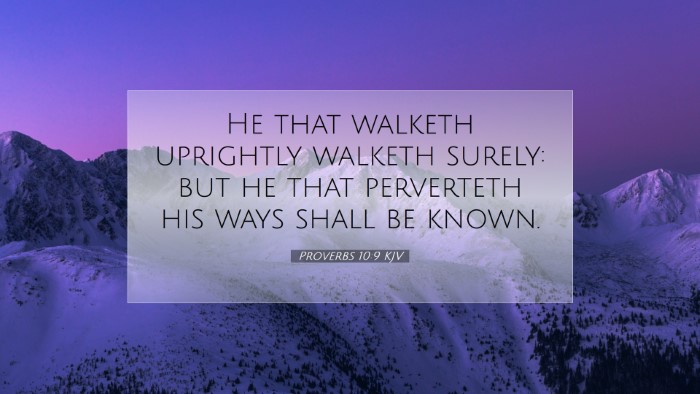Commentary on Proverbs 10:9
Verse: "He who walks in integrity walks securely, but he who perverts his ways will be found out." (Proverbs 10:9)
Introduction
This verse presents a contrast between two types of behavior: the way of the righteous and the way of the wicked. It holds significant implications for both moral character and the consequences of one's actions, making it a rich subject for theological reflection.
Walking in Integrity
Matthew Henry's Commentary: Henry underscores the importance of integrity, describing it as a fundamental quality that provides a solid foundation in one’s spiritual and moral life. He notes that walking in integrity implies a consistency between one's beliefs and actions. This integrity secures the individual's path, ensuring peace and safety in one's personal and communal engagements.
Albert Barnes' Notes: Barnes reflects on the idea of "walking" as a continual act, signifying that a life of integrity is not merely about isolated actions but a habitual disposition. He emphasizes that those who are upright in their dealings gain the trust of others and can proceed with confidence in their affairs, knowing they are adhering to God's principles.
Adam Clarke's Commentary: Clarke elaborates on the phrase "walks securely," indicating that living with integrity fosters a sense of security that transcends external circumstances. He suggests that a person of integrity, guided by their moral compass, can face challenges without fear, for they are grounded in their honesty and virtue.
The Consequences of Perverting One's Ways
Matthew Henry's Insight: Henry warns that those who "pervert their ways" are engaging in deceitful practices that will ultimately lead to exposure and downfall. He asserts that hidden actions cannot remain concealed forever, and divine justice ensures that such individuals will be found out.
Albert Barnes' Examination: Barnes draws attention to the inevitability of being discovered when engaged in wrongdoing. He argues that while perpetrators may believe they can evade consequences, the truth will eventually surface—either in this life or in the final judgment. He stresses that moral corruption is self-destructive and undermines relationships and trust.
Adam Clarke's Analysis: Clarke touches upon the broader implications of this verse, highlighting that societal stability hinges on individual integrity. He asserts that the wicked may flourish temporarily, but their ultimate fate leads to ruin and disgrace. The ethical ramifications of corrupt practices extend beyond the individual to affect communities at large.
Application for Life
In light of this verse, pastors and theologians can draw several key applications:
- Moral Integrity as a Foundation: Pastors should encourage congregants to cultivate integrity in both personal and communal lives, recognizing it as essential for building a trustworthy character.
- Accountability and Community: It is vital for churches to foster a culture of accountability, helping each other maintain integrity and to avoid the pitfalls of deceitfulness.
- Confidence in God’s Justice: Believers should find comfort in the assurance that God will ultimately hold accountable those who act unjustly, encouraging them to live out their faith authentically.
Conclusion
Proverbs 10:9 encapsulates a timeless truth about the nature of integrity and dishonesty. The commentary insights from esteemed theologians remind us that while the path of righteousness may sometimes seem arduous, it is ultimately the path that leads to security and peace. In contrast, the deceptive ways may offer temporary advantage but lead only to exposure and ruin. As we reflect on this verse, we are called to examine our lives and commit to walking in integrity, both for our own sake and for the witness it provides to the world around us.


